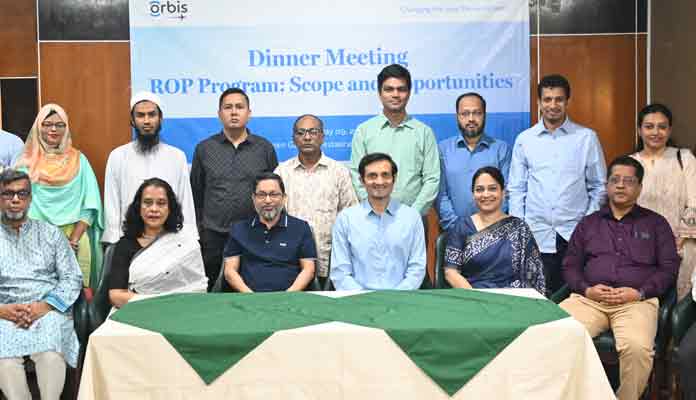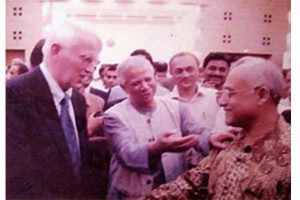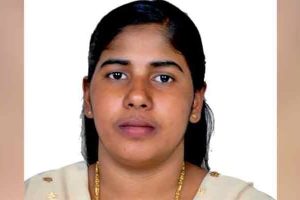
Dhaka, May 11: A globally acclaimed Indian retina specialist has suggested creating a task force and introducing a national programme to expand retinopathy of prematurity (ROP) services across Bangladesh to prevent avoidable blindness among children while major stakeholders in the field endorsed the suggestion.
Prof Dr Anand Vinekar, Programme Director of KIDROP at Narayana Netralaya eye institute at Bangalore in India, made the suggestion at a dinner meeting with Bangladesh’s leading ophthalmologists, government stakeholders and NGOs working in eye health, at a restaurant in Dhaka on Thursday night.
“It’s high time now to create a national task force under the leadership of BSMMU [Bangabandhu Sheikh Mujb Medical University] and NIO&H [National Institute of Ophthalmology and Hospital] accommodating neonatologists, gynaecologists, international NGOs and other stakeholders to expand ROP services,” he said.
Dr Munir Ahmed, Country Director of Orbis International, moderated the meeting where ophthalmologists, neonatologists and representatives from health sector regulators, international NGOs and eye hospitals in different parts of the country presented the existing situation in ROP services and suggested actions needed to make it available across the country.
They said many health facilities dealing with eye diseases lack capacity in terms of human resources, appropriate equipments, tele-consultation and responsive referral system which need to be available across the country.
ROP is a unique vaso-proliferative disorder affecting the avascular retina of premature and low birth weight neonates. If not detected and treated timely, it can quickly progress to the blinding stage. Timely screening – within 30 days of life – and treatment in the early stage of ROP, however, can prevent blindness.
Speaking at the meeting organized by Orbis International, Dr Khaleda Islam, former Director of Primary Health Care of the Directorate General of Health Services (DGHS), said a system protocol needs to be established involving health professionals of all tiers and community to bring every preterm baby born anywhere in the country under ROP screening.
Prof Dr Nuzhat Choudhury from the Ophthalmology Department of BSMMU suggested development of a national plan of action to utilize the existing resources for increased coverage and access to ROP services.
She also recommended close supervision and quality monitoring of health facilities dealing with eye diseases and the creation of mid-level health care personnel for the NICUs and SCANUs for taking paediatric ocular images and sending them to tertiary facilities.
Referring to WHO, Dr Munir Ahmed said that for every 10 million population Bangladesh needs one child eye centre. “But if we consider ROP, we also need to look into how many centres have been already equipped for screening and referral but not being utilised optimally.”
Dr Md Jahirul Islam, Programme Manager of MNC&AH at DGHS, emphasised revitalisation of the existing ROP national steering committee and national eye care operational plan to accelerate ROP services in a collaborative way.
Dr Dewan Md Emdadul Hoque, Health Manager at UNICEF, expressed his interest in working closely at the national level to support the national ROP programme in Bangladesh.
Dr Tariq Reza Ali, Associate Professor at BSMMU, emphasised the need for coordination support of the facilities with appropriate and fundamental equipment to continue ROP services.
Prof Dr Sanjoy Kumar Dey, Chairman of Neonatology Department at BSMMU, Dr Md Jahurul Islam, Programme Manager at DGHS, AKM Badrul Huq, Programme Manager at Fred Hollows Foundation, Dr Md Mahfuzur Rahman, Senior Programme Manager at IRD Global, Dr ANM Ehtesham Kabir, Mahsina Afroz, Programme Manager at Orbis International, Dr Arifur Rahman, Consultant at Deep Eye Care, Dr Sajal Paul, Surgeon at Dr K Zaman BNSB Eye Hospital, Shamim Khan, Programme and Admin Coordinator at Mazharul Haque BNSB Eye Hospital, and Dr Sohel Mahmud and Dr Mohammad Farhad Hossain from Isphani Islamia Eye Hospital also spoke at the meeting.
According to the UN, more than three million children are born every year in Bangladesh – of them 12.5 percent or around 400,000 preterm while a national survey found that 22.6 percent of babies are born with low birth weight – below 2.5kg – in the country. The preterm and low-birth weight babies bear the risk of developing ROP.
Rumi/D






